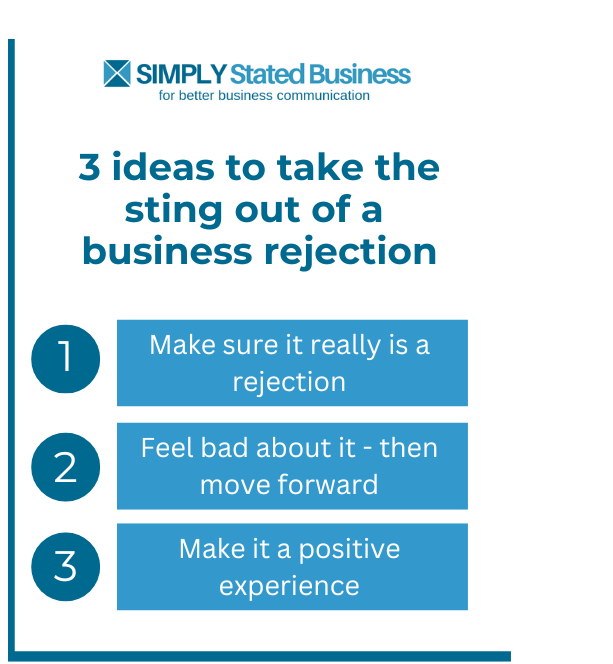
Rejection hurts. No matter the reason for it. It’s tough not to take it personally.
And rejection is an equal opportunity offender. It may be personal or strictly business, such as the following business rejection.
- A lost sale
- A rejected proposal
- Business communication that falls flat
But instead of wallowing in the pain, step back and take an objective look at the reason.
The following three ideas can help remove the sting of a business rejection.

#1 – Make sure it really is a rejection.
You may interpret certain signs as rejection. But could there be another meaning? Below are three typical signs you may view as a big, fat no.
- You have a great meeting, then crickets – no response at all.
- You’re asked to submit a proposal (or a quote) but then silence dominates the airwaves.
- Or the recipient grouses over fees or product price.
Lack of Response
We’ve all been there. We have a great meeting with a prospect or an interview for a job – then nothing. No follow-up email – no phone call – no thanks-but-no-thanks letter.
- Do you hide and lick your wounds?
- Or do you follow up and ask for an update?
Life happens. Priorities change or events occur that alter a company’s direction. And, yes, sometimes the people in charge are lousy at following up.
One thing I often saw in my corporate days was how long it took for the interview process.
When I was in management, I stressed to my supervisors how important it was to update the applicants.
Tip for employers and how you can help:
- Let applicants know when to expect a response.
- Encourage them to call if they have not heard within that timeframe.
- If circumstances change, let the applicant know.
If you are the applicant or a salesperson who attended that great meeting – follow up. You may receive a solid No, but wouldn’t you rather know something?
A lack of response does not always equal rejection.
Silence Following Submission
Creating a proposal or quote for your services can take a lot of time. You owe it to yourself to hear from the prospect.
But be smart about when and how you follow-up.
- Leave stalking to your competitors.
- Limit the frequency and how many times you follow up.
- And please don’t participate in tag-team follow-up (where multiple team members email the prospect).
Respect the prospect’s process for notification.
Formal Requests for Proposals typically come with multiple dates for compliance (when to submit questions, deadline for submission, etc.). But do follow up.
Ask for feedback.
- Is there additional information the prospect needs?
- If not indicated, ask when they expect to finalize their decision.
Grousing Over Price/Fees
Real or imagined, some prospects view themselves as great negotiators. For some, they never buy a product without negotiating.
If the first response you receive is grousing about the fee, it may be the signal to rev up your negotiating skills.
- Of course, it could mean they’re cheap.
- You decide if there is room for negotiations.
#2 – Feel bad about it.
Surprised by that suggestion?
It’s okay to feel bad about rejection – if you learn from it and move on.
Let’s face it, our products and services are our babies. When someone says no to them, it’s like calling your baby ugly.
Allow yourself to feel bad, but then put on your business hat and look at it objectively.
- Are your fees noncompetitive or is the prospect unable to afford the best right now?
- Are your products/services lacking or is the prospect not a good fit?
- Was your business communication effective as it could be?
Rejection may have nothing to do with the quality of your product or service. You won’t know if you don’t ask.
#3 – Make it a positive experience.
Rejection – positive? Sure, it is.
- You receive valuable feedback (even if you must ask for it).
- You have another opportunity for the future.
If you leave the prospect with a professional response, they WILL remember you.
Send a formal thank you
Thank the prospect for their time, their feedback, and wish them continued success.
Make it easy for them
Most people do not like to deliver bad news. Prospects appreciate a gracious, professional response.
Taking the sting out is a two-way street.
Some prospects avoid the uncomfortable feeling of delivering bad news by not responding at all. If I suspect the reason is something like they cannot afford my fees, I make it easy for them to say no.
- Why would I do that?
- Hearing something beats silence.
- And you may nudge them into a positive response.
I send them a follow-up email asking –
Have you made a decision about my proposal, or have you decided to go another route?
I almost always receive a response back – and more than once – they hired me.
The Perfect Antidote to Rejection?
You’re not going to win them all. But sometimes a rejection may not be one after all. But if it is, it’s not the end of the world. Feel bad about it and then spin it into something positive. Next time you may just win.
- How do you handle rejection?
- Have you turned rejections into sales?
- Please share your story in Comments.
====================
Note: This October 1, 2024 post updates the original post published January 30, 2012.
=====================
Helping you Keep it simple, clear & uniquely yours
=====================

Cathy, I particularly like your ‘make it easy for them.’ What a great way to move things forward and also spread some peace around. Sure I’d rather not get a no, but your response would go a long way toward taking at least some of the sting out of it.
It’s also an approach that could lead to work down the road.
Excellent.
Thanks, Anne. That’s what I found. More than once I ended up with work later and the individual commented that they appreciated the professional approach to the proposal.
Thanks for stopping by and sharing your thoughts, Anne.
Cathy, you illustrate not just how but why common courtesy can go a long way. When we receive rejections – no matter the cause – we’re stung. Some people react immediately by swatting back, some react with self-pity, but those who take a deep breath before reacting can find a diplomatic way to keep the door open.
Well put, Paula! Thanks for stopping by and sharing your perspective. 🙂
Oh, I don’t know. I still consider each and every rejection an issue. I don’t make it an earth shattering, tear down the walls event, but it’s clearly time for reflection and consideration what should have been done better- or not at all.
Agree, Roy, we learn from rejection, but we need to see it for what it is and not inject something it isn’t. How’s that for profound? 😀
Thanks for sharing your take, Roy.
You have a way of making even rejection feel okay. Thanks, Cathy. 🙂
It’s that Pollyanna thing, Lori. Either that or lots of experience with it. 😀
Perfectly said Cathy! Simply put, it’s just business. Taking it personal has been a flaw of mine and I can see now why it’s not a personal attack against us. Great insight!
Thank you, Barbara. I think we all do that from time to time. I appreciate you dropping by and sharing your thoughts.
Rejection is a learning experience. #3 is especially true, you can always benefit from rejection as well as an acceptance, both can be viewed in a positive light. Thank you.
Good perspective, Mike. Thanks for dropping by and sharing it.
Rejection isn’t a personal reflection, it’s business and the learning experience is crucial to know what is needed for the next pitch. You have gain a lesson to takeaway from the rejection. Thanks for the blog, great lesson for all. Cheers.
I was just learning how Colonel Sanders got 1008 rejections before finally selling is infamous KFC recipe. I always think of that when I get rejected 100 times in a row:)
Just had a beautiful example where was it rejection or just electronic mail letting us down. We make some major assumptions about what is happening. People are away. The mail fails to arrive. And so many other things that say we need to follow up. Like the post and will definitely refer others to it.
Hi Jen: Thanks for stopping by and sharing your view. Ah, life lessons-they’re all around us. 🙂
Thanks again, Jen.
Hi Roberta: Great example where we assume it’s rejection when it might just be technology that’s the problem. Thanks for sharing that. And I appreciate the referral. 🙂
Preston-had to drag you out of the spam folder. 🙂 Great example of persevering through rejection.
Thanks for stopping by and I hope your rejections don’t equal the Colonel’s, but your success does, 🙂
Cathy,
I like your last point about seeing this rejection as feedback and turn a negative into a positive. You are right we need to keep the line communication open and for relationship.
In this same regard, when we reject a person on Facebook we are telling that person we reject you. You lost a future connection with a friend or client.
Would it be better to archive them in a pending contact list, and revisit them at a later time? Maybe, then you will want to accept their connection.
Hi Mike: I never thought about the friend request aspect. I tend to not reject requests outright of those I do not know at all, but that probably has more to do with just what you’re talking about. It seems rather personal. 🙂
I appreciate you stopping by and commenting, Mike.
This is great advice! I love how you remind us that we must look at it positively and use it to change how we do it next time to get success! Thanks for sharing.
Thanks for the kind words, McKenzie. 🙂